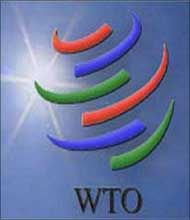 Amid mounting protest, India seems to have finally agreed to a four-year interim measure, or a ‘peace clause’, that will do away with the cap on food subsidies for farm support in developing countries under the World Trade Organization norms.
Amid mounting protest, India seems to have finally agreed to a four-year interim measure, or a ‘peace clause’, that will do away with the cap on food subsidies for farm support in developing countries under the World Trade Organization norms.
A decision on this will be taken next week during the ninth Ministerial Conference in Bali, Indonesia.
According to the final draft of the negotiating text circulated by WTO Director-General Roberto Azevedo among trade ministers of the 159 member countries on Wednesday night, on public stockholding for food security purposes, a developing country like India can provide subsidies for farm support even if those exceed the permissible 10 per cent cap.
However, the interim measure has become extremely controversial, especially in the wake of the government’s recently-announced National Food Security Act, 2013.
Political parties, farmers and some sections of the civil society are vehemently opposing this and demanding a permanent solution.
To continue to give subsidies within their domestic constituencies in future as well, it is crucial for India and other developing countries to get the subsidy regime changed under the WTO Agreement on Agriculture.
In the draft text, the members have also agreed to seek a permanent solution, as demanded by India, before 2017, when the 11th Ministerial Conference takes place.
But that has been accepted only as a post-Bali agenda.
“The very fact that the need for a permanent solution has been accepted by the members is a big achievement for India,” a senior official involved in the talks, asking not to be named, told Business Standard.
However, despite WTO agreeing to a permanent solution, making all members agree and deliver on their commitments is going to be difficult.
So, the prospects of amending the AoA on subsidies have been delayed further.
Also, the proposed ‘peace clause’ is not completely immune to challenges and can always be disputed under the Agreement on Subsidies and Countervailing Measures.
“The clause in its current form is not in our interest.
“We cannot compromise on the livelihood of millions of subsistence farmers in India. “We cannot accept any limitation on our food security programme.
“The much-hyped food security for Indians will eventually come to a nought in just four years if this peace clause is acceded to,” said Arun Jaitley, member of the Bharatiya Janata Party and the leader of Opposition in the Rajya Sabha.
In a letter to Shanta Kumar, chairperson, Standing Committee on Commerce, Pradeep Mehta of CUTS International, who also sits on a high-level panel at WTO, has said the commitments under FSA are enormous, but these cannot be considered ‘trade-distorting’
At present, under AoA, subsidies given for domestic support measures and export of up to 10 per cent of the value of the total agricultural production are exempt from any challenge. However, the base price for calculating subsidies is taken at the 1986-88 level. And, India has not been notifying its subsidies since 2004.
Developing countries like India, China and Brazil are already on the threshold of breaching the permissible level due to a rise in global food prices.
As a result, the G-33 coalition of developing countries, which includes these nations, have been pushing WTO to change the AoA.
“Under FSA, a pet project of the United Progressive Alliance government, rice, wheat and millet are provided at subsidised rates.
The US spent $94 billion on its food aid programmes in 2010; this expenditure reached $100 billion in 2012.
The European Union, on the other hand, offers subsidies worth $60 billion as direct farm subsidy annually.
Indian industry has also urged the government to revive the stalled Doha round of global trade talks, which started in the Qatari capital in 2001 to help poorer countries prosper through trade liberalisation.
But the talks have failed to reach a consensus, even as the rich and developing countries continue to spar over agricultural subsidies and tariff reduction on industrial goods.
The Cabinet Committee on WTO-related matters, headed by Prime Minister Manmohan Singh, is expected to meet on Thursday to firm up India’s negotiating strategy at the Bali meet.
YIELDING AT LAST
Peace clause: India has agreed to four-year peace clause, which will be discussed at WTO MC9 in Bali next week
Challenge: The peace clause cannot be challenged at WTO under Agreement on Agriculture but it can be disputed under Agreement on Subsidies and Countervailing Measures
Subsidy: Under the clause, India will be allowed to offer food subsidies of more than the 10 per cent limit permitted under WTO norms
Permanent solution: WTO has agreed to India’s demand for a permanent solution in allowing the subsidies prohibited at present
Post-Bali agenda: A permanent solution will be discussed by WTO after the Bali meet
Cabinet meet: The Cabinet Committee on WTO-related matters is expected to meet on Thursday to firm up India’s negotiating strategy









 © 2025
© 2025